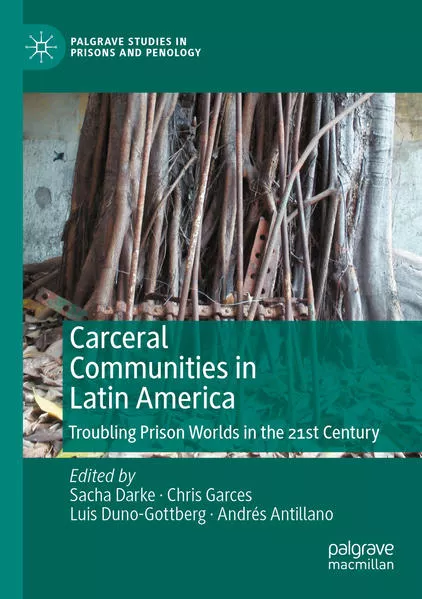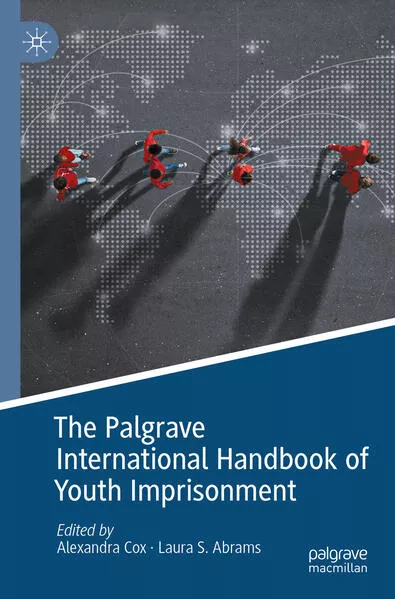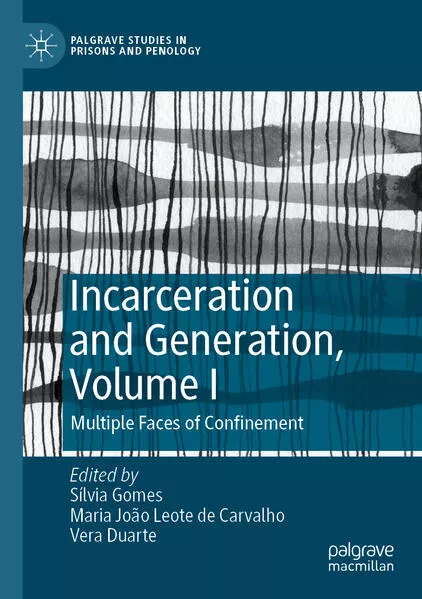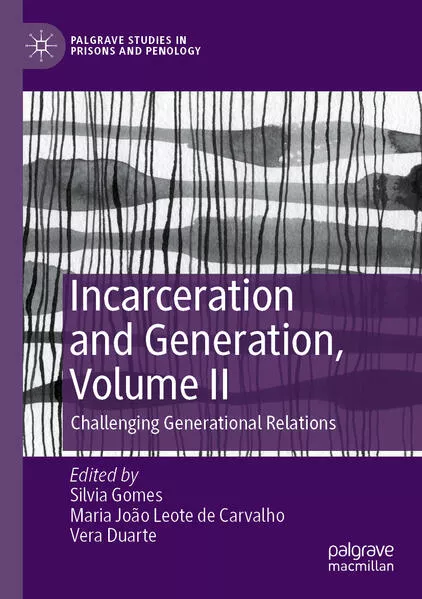Chronologie aller Bände (1 - 8)
Die Reihenfolge beginnt mit dem Buch "Carceral Communities in Latin America". Wer alle Bücher der Reihe nach lesen möchte, sollte mit diesem Band von Sacha Darke beginnen. Der zweite Teil der Reihe "The Palgrave International Handbook of Youth Imprisonment" ist am 23.06.2022 erschienen. Mit insgesamt 8 Bänden wurde die Reihe über einen Zeitraum von ungefähr 3 Jahren fortgesetzt. Der neueste Band trägt den Titel "Prison Violence".
- Anzahl der Bewertungen für die gesamte Reihe: 0
- Ø Bewertung der Reihe: 0
- Start der Reihe: 29.03.2022
- Neueste Folge: 03.07.2025
Diese Reihenfolge enthält 6 unterschiedliche Autoren.
- Autor: Darke, Sacha
- Anzahl Bewertungen: 0
- Ø Bewertung:
- Medium: Buch
- Veröffentlicht: 29.03.2022
- Genre: Krimi
Carceral Communities in Latin America
This book gathers the very best academic research to date on prison regimes in Latin America and the Caribbean. Grounded in solid ethnographic work, each chapter explores the informal dynamics of prisons in diverse territories and countries of the region – Venezuela, Brazil, Bolivia, Honduras, Nicaragua, Colombia, Puerto Rico, Dominican Republic – while theorizing how day-to-day life for the incarcerated has been forged in tandem between prison facilities and the outside world. The editors and contributors to this volume ask: how have fastest-rising incarceration rates in the world affected civilians’ lives in different national contexts? How do groups of prisoners form broader and more integrated ‘carceral communities’ across day-to-day relations of exchange and reciprocity with guards, lawyers, family, associates, and assorted neighbors? What differences exist between carceral communities from one national context to another? Last but not least, how do carceral communities, contrary to popular opinion, necessarily become a productive force for the good and welfare of incarcerated subjects, in addition to being a potential source of troubling violence and insecurity? This edited collection represents the most rigorous scholarship to date on the prison regimes of Latin America and the Caribbean, exploring the methodological value of ethnographic reflexivity inside prisons and theorizing how daily life for the incarcerated challenges preconceptions of prisoner subjectivity, so-called prison gangs, and bio-political order.
Sacha Darke is Senior Lecturer in Criminology at University of Westminster, UK, Visiting Lecturer in Law at University of São Paulo, Brazil, and Affiliate of King’s Brazil Institute, King’s College London, UK.
Chris Garces is Research Professor of Anthropology at Universidad San Francisco de Quito, Ecuador, and Visiting Lecturer in Law at Universidad Andina Simón Bolivar, Ecuador.
Luis Duno-Gottberg is Professor at Rice University, USA. He specializes in Caribbean culture, with emphasis on race and ethnicity, politics, violence, and visual culture.
Andrés Antillano is Professor in Criminology at Universidad Central de Venezuela, Venezuala.
- Autor: Cox, Alexandra
- Anzahl Bewertungen: 0
- Ø Bewertung:
- Medium: Buch
- Veröffentlicht: 23.06.2022
- Genre: Politik
The Palgrave International Handbook of Youth Imprisonment
- Autor: Gomes, Silvia
- Anzahl Bewertungen: 0
- Ø Bewertung:
- Medium: Buch
- Veröffentlicht: 09.10.2022
- Genre: Krimi
Incarceration and Generation, Volume I
This two-volume, edited collection lays the groundwork for an international exploration of incarceration and generation, cover a range of geographic, judicial and administrative contexts of incarceration from contributors across a range of subjects. Volume I explores an array of experiences, dynamics, cultures, interventions and impacts of incarceration in specific generations: childhood, youth and emerging adulthood, adulthood and older age. It covers topics such as: the expansion of the penal landscape; deprivation of liberty regarding children, the problem of unaccompanied migrant children; the incarceration of young adults and adults, exploring its impacts within and beyond incarceration and the consequences of imprisoning older populations. Volume II examines intergenerational relations issues within different contexts of incarceration. This collection discusses public policies and the role of the state and the citizen deprived of liberty. It speaks to academics in criminology,sociology, psychology, and law, and to practitioners and policymakers interested in incarceration.
- Autor: Gomes, Silvia
- Anzahl Bewertungen: 0
- Ø Bewertung:
- Medium: Buch
- Veröffentlicht: 03.11.2022
- Genre: Krimi
Incarceration and Generation, Volume II
- Autor: Murray, Conor
- Anzahl Bewertungen: 0
- Ø Bewertung:
- Medium: Buch
- Veröffentlicht: 07.07.2023
- Genre: Krimi
Young Men, Masculinities and Imprisonment
Given the over-involvement of young men in crime and young men’s disproportionally high rates of reoffending, it is surprising that more research has not explored young men’s experiences of prison. This book is based on the findings of a nine-month ethnographic case study of Hydebank Wood College, a young men’s prison in Northern Ireland. It seeks to explore the complexity of gender construction and masculine performance during young adulthood, while also exposing and dissecting the turbulent social life of a young men’s prison.
In examining these themes, the book takes account of the unique social, economic, and political factors that impact young men in communities in Northern Ireland, paying particular attention to their feelings of powerlessness, marginalisation, and vulnerability, and the construction of identity in cultures defined by territorialism, violence, masculine stoicism, and an anti-authority code of ‘honour’. The book follows the formation of masculinitiesthrough the prison gate and considers how the penal environment contributes to the continual shaping young men’s identities. The book also adopts Gambetta’s concept of ‘signalling’ to examine how young men use different practices, such as language and embodiment, to communicate masculinity to their wider social audience. At the same time, it also considers the reluctance of young men to communicate about their sources of vulnerability.
- Autor: Murray, Conor
- Anzahl Bewertungen: 0
- Ø Bewertung:
- Medium: Buch
- Veröffentlicht: 15.07.2024
- Genre: Krimi
Young Men, Masculinities and Imprisonment
Given the over-involvement of young men in crime and young men’s disproportionally high rates of reoffending, it is surprising that more research has not explored young men’s experiences of prison. This book is based on the findings of a nine-month ethnographic case study of Hydebank Wood College, a young men’s prison in Northern Ireland. It seeks to explore the complexity of gender construction and masculine performance during young adulthood, while also exposing and dissecting the turbulent social life of a young men’s prison.
In examining these themes, the book takes account of the unique social, economic, and political factors that impact young men in communities in Northern Ireland, paying particular attention to their feelings of powerlessness, marginalisation, and vulnerability, and the construction of identity in cultures defined by territorialism, violence, masculine stoicism, and an anti-authority code of ‘honour’. The book follows the formation of masculinitiesthrough the prison gate and considers how the penal environment contributes to the continual shaping young men’s identities. The book also adopts Gambetta’s concept of ‘signalling’ to examine how young men use different practices, such as language and embodiment, to communicate masculinity to their wider social audience. At the same time, it also considers the reluctance of young men to communicate about their sources of vulnerability.
- Autor: Chamberlen, Anastasia
- Anzahl Bewertungen: 0
- Ø Bewertung:
- Medium: Buch
- Veröffentlicht: 26.07.2024
- Genre: Politik
Geographies of Gendered Punishment
This edited book explores new and enduring themes in the gendered experience of incarceration across the world. Capturing global debates and research on women’s treatment, their coping and resistances in penal settings, the collection promotes a feminist agenda that is attuned to the inherently patriarchal and intersectionally oppressive structures of contemporary punishment. It seeks to map policies and campaigns around women’s criminalisation across the world and offers one of the most comprehensive overviews of women’s imprisonment experiences across the Global North and Global South. Each chapter focusses on a different geographic context and theme and aims to provide the intellectual groundwork for a critical, world-wide movement advocating for women’s decarceration. As a whole, the collection offers a robust empirical understanding of women’s punishment in non-western, Global South contexts and also revisits ongoing debates in feminist accounts of punishment in the Global North.
In doing so, the collection examines hierarchical geopolitical relations between privileged and underprivileged nations, reflecting global inequalities and structural violence rooted in legacies of imperialism and colonialism. Overall, the edited collection shows how centering women’s peripheralized experiences can radically reshape our understanding of punishment and offers a new intellectual, methodological, and political means through which to think about gendered identity and imprisonment in the 21st Century.
- Autor: Gooch, Kate
- Anzahl Bewertungen: 0
- Ø Bewertung:
- Medium: Buch
- Veröffentlicht: 03.07.2025
- Genre: Krimi
Prison Violence
This book analyses the nature, causes, logic, and culture of prison victimisation in an English young offender institution for young men aged 18-21 years old. Drawing on ethnographic and qualitative research, this book offers a comprehensive analysis of the gendered, situational, individual, and moral components of prison victimisation. It explores how wider technological, economic, policy, political, and cultural changes have altered the texture and structure of prison life and prison violence, and with what consequences. Ultimately, the book argues that high levels of prison violence are not inevitable. Rather, the prevention of prison violence requires a just, lawful, humane, and hopeful environment, and failing to create such is tragically life-changing for young prisoners.







